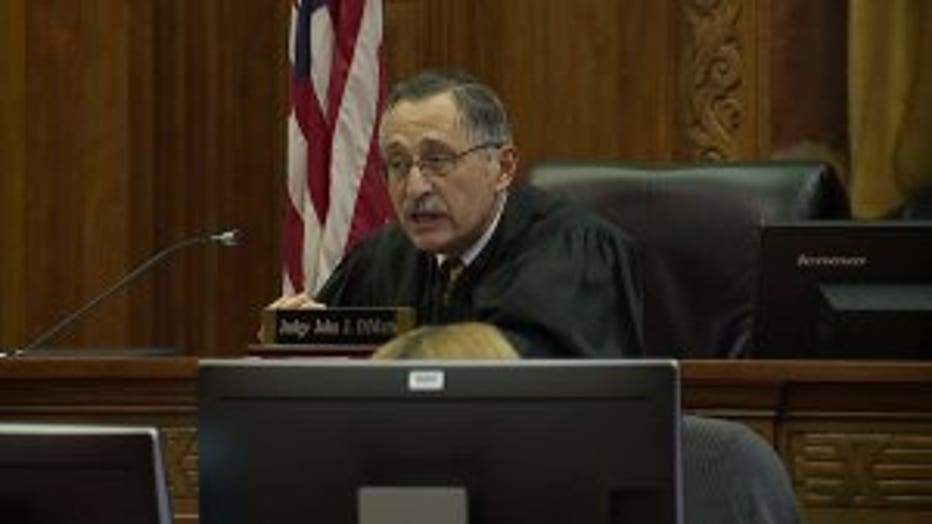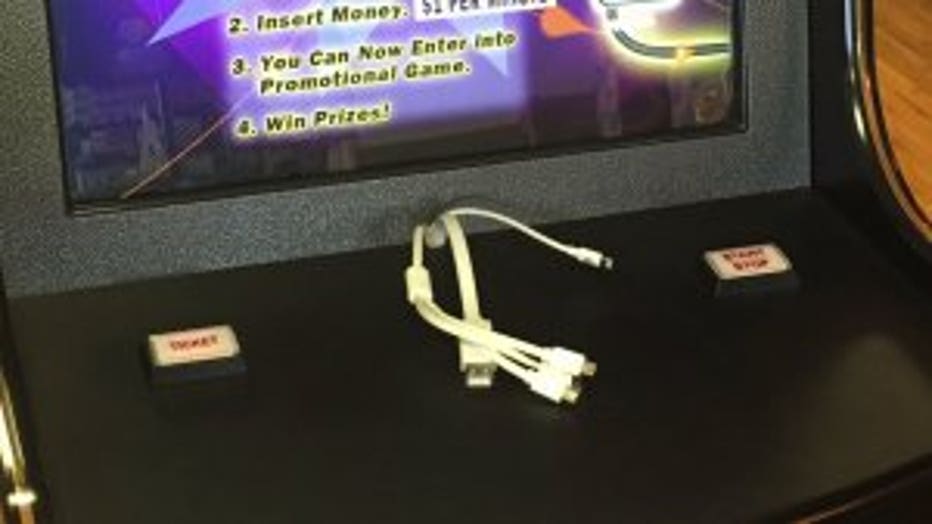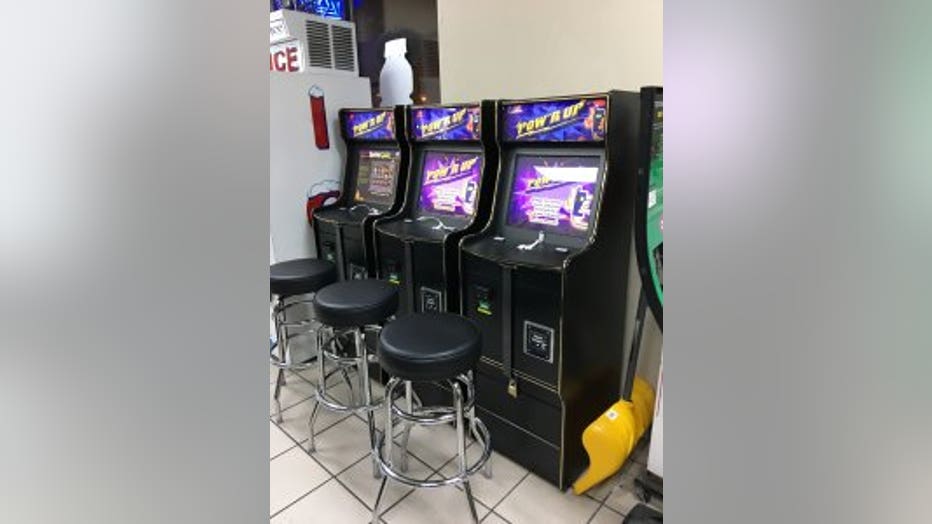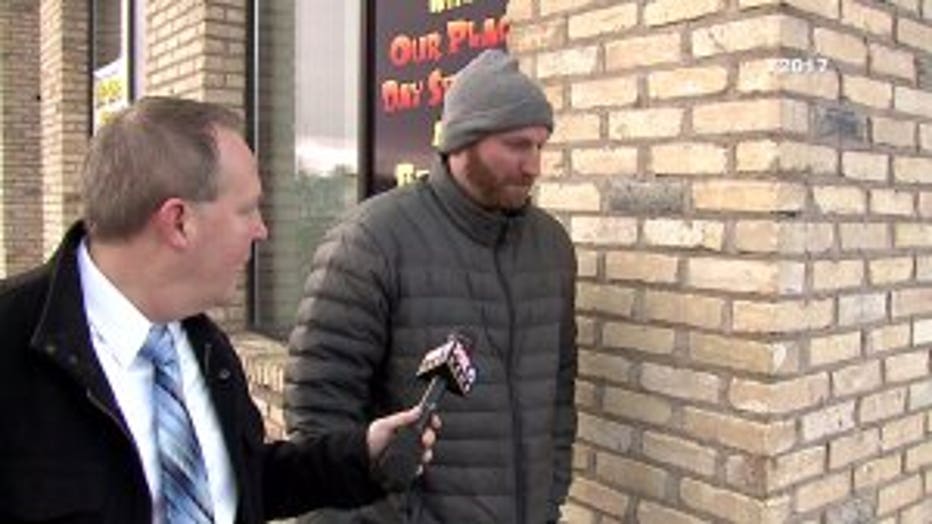Judge declares gas station phone chargers to be illegal 'gambling machines'
MILWAUKEE— Are they slot machines or cell phone chargers? A FOX6 investigation finds video gaming consoles moving into gas stations all over southeastern Wisconsin.
The state says they're against the law, but FOX6 Investigators show you what a Milwaukee judge says about 'gasinos.'
You put money in. You play a game of chance. You hope to win a jackpot.

Milwaukee County Circuit Judge John DiMotto declares the Quick Charge Kiosk machines to be "gambling machines."
In other words, the so-called 'Pow'r Up' machines at some local gas stations "are kind of like slot machines," according to Milwaukee County Circuit Judge John DiMotto.
The company behind the machines insists they are not gambling devices.
"It's a vending machine running a promotional game," said Daryl Laatsch, attorney for Quick Charge Kiosk, which operates the machines.
Quick Charge Kiosk is owned and operated by Jeremy Hahn of West Bend whose father, Lester Hahn, was sentenced to prison in the early 1990's for operating video poker machines in taverns. The elder Hahn appealed his case and lost. However, the Wisconsin Court of Appeals wrote at the time that video poker machines are not necessarily "gambling machines" if they're used for a legal purpose.
More than two decades later, Jeremy Hahn is putting video slot machines into local gas stations with one significant alteration -- his machines are equipped with cables that can charge your cell phone.
"Your position is, this is a charging machine," DiMotto said to the company's lawyers. "People are paying to charge their phone."
Attorneys for Quick Charge say they are merely using what looks like a slot machine game as a way to promote their new cell phone charging stations, in hopes of gaining traction in the marketplace.

The machines operated by Quick Charge Kiosk work much like traditional video slot machines with the addition of cell phone charging cables.
Here's how it works: For every dollar you put into the machine, you get one minute of charging time. You also receive 100 "entries" in a promotional game you can play while you wait -- a game that awards real cash prizes. Hahn's lawyers say it's a perfectly legal promotion that is protected under Wisconsin law.
"I think it's a complete violation of the spirit of the law," said Lorri Pickens of Citizens Against Expanded Gambling. "I mean, there's no question about that. He thinks he's found a loophole."
But has he? In September of 2015, the Wisconsin Department of Justice ordered Hahn to remove his machines from area gas stations, arguing they do not qualify as a legal promotion and are "illegal" gambling machines. In return, Hahn filed a lawsuit hoping a judge would give him -- and the gas station owners he markets the machines to -- legal clarity. Now, Milwaukee County Judge John DiMotto is finally weighing in.
"The lines have been drawn in the sand," DiMotto said.
In making a determination, Judge DiMotto had to navigate Wisconsin's convoluted gambling statutes, which have been altered and amended many times over the years. For more than 100 years after Wisconsin became a state, gambling of all kinds was illegal. That is, until 1965, when voters approved a constitutional amendment to allow certain promotional contests. Since then, voters have also approved charitable bingo games, raffles, pari-mutuel betting (on dog racing, for instance) and the creation of a state lottery. Outside of tribal casinos, however, video gambling machines are still against the law.
Changes in state law in 1999 and 2003 have allowed bars and restaurants with Class "B" liquor licenses to keep up to five video gambling machines without risking enforcement. They are still illegal, just not criminal.
But video gambling in Class "A" liquor establishments -- such as gas stations -- remains a crime. And Assistant Attorney General Colin Roth says outfitting a machine with charging cable doesn't change that.

The company distributes machines under the brand name "Pow'R Up" to area gas stations and convenience stores.
"These kinds of machines have been creatively constructed to evade gambling laws for about 100 years now," Roth told the court.
Lawyers for Quick Charge countered that their machines are essentially digital versions of a paper pull tab sold in gas stations, bars and restaurants all over the state. Pull tabs are allowed under a provision of state law that exempts "in-pack chance promotions."
"As thinly-veiled as this may be, if the legislature doesn't like it, they can change the law," said Quick Charge Kiosk attorney Emil Ovbiagele.
The judge didn't buy it.
"''In-pack'," he emphasized. "A pack is something finite, and I don't see anything finite about the machine."
In a decision issued February 19th, Judge DiMotto writes the Quick Charge Kiosk machines are indeed illegal "gambling machines."
Even that hasn't stopped Hahn from operating them. Three days after the decision declaring the machines illegal, the FOX6 found a pair of them still operating at a gas station in Sussex.

Jeremy Hahn has declined requests for an on camera interview, but did answer some questions through Facebook Messenger.
Jeremy Hahn declined an on camera interview with FOX6 Investigators, citing his attorney's advise. In a text message exchange through Facebook Messenger, he wrote that there are "roughly 60,000 illegal gambling machines in bars."
And while "the state could stop them," he says, "they are not doing anything about it. Feature that," he wrote, with a
Judge DiMotto did not completely close the door on the notion that a digital gaming device could be created that passes legal muster. Just not this one. And, borrowing the words of another judge from a landmark Wisconsin gambling case, DiMotto declared, "If you don't like my decision, change the law!"
Jeremy Hahn says he intends to appeal the judge's decision very soon and hopes to ask for permission to continue operating his machines while the appeal is pending.
During a deposition for this case, Hahn told state investigators his machines have already taken in more than $5.2-million in revenue since 2012, though he claims to have barely broken even in terms of profit.

